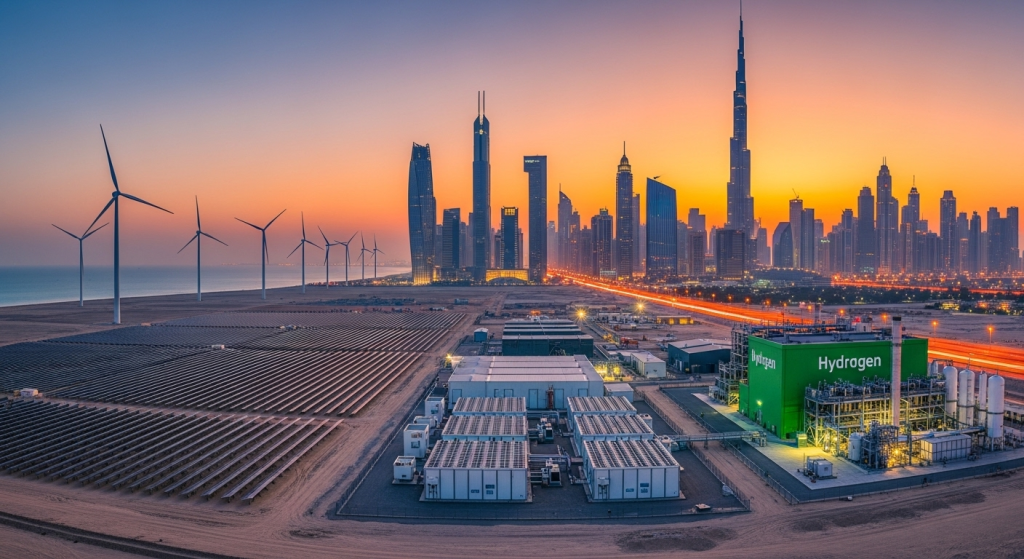The United Arab Emirates (UAE) is rapidly evolving into a global hub for renewable energy investments. With its ambitious goals for sustainability and a commitment to diversifying its economy away from oil dependency, the UAE’s renewable energy sector presents a plethora of opportunities for both local and international investors. This article delves into the latest trends, government initiatives, and potential investment avenues within the UAE’s renewable energy landscape.
Current State of the Renewable Energy Sector in the UAE
The UAE has made significant strides in renewable energy over the past decade. The country’s Vision 2021 aims to increase the contribution of clean energy to the national energy mix to 50% by 2050. This commitment is reflected in various projects and initiatives that have been launched, positioning the UAE as a leader in the Middle East’s renewable energy sector.
Key Projects and Initiatives
Several landmark projects highlight the UAE’s commitment to renewable energy:
– **Mohammed bin Rashid Al Maktoum Solar Park**: This is one of the largest solar parks in the world, with a planned capacity of 5,000 MW by 2030. The park is a cornerstone of Dubai’s clean energy strategy and serves as a model for solar energy projects globally.
– **Noor Abu Dhabi**: This solar power plant has a capacity of 1,177 MW and is one of the largest single-site solar projects in the world. It plays a vital role in Abu Dhabi’s efforts to reduce carbon emissions.
– **Dewa’s Green Hydrogen Project**: Dubai Electricity and Water Authority (DEWA) is pioneering a green hydrogen project that will utilize solar power to produce hydrogen, showcasing innovation in the renewable sector.
Government Support and Policies
The UAE government has implemented several policies to encourage investment in renewable energy. Key initiatives include:
– **Investment Incentives**: The UAE offers various incentives for renewable energy projects, including tax exemptions, land grants, and streamlined licensing processes. These incentives are designed to attract foreign direct investment (FDI) and foster local entrepreneurship.
– **Public-Private Partnerships (PPPs)**: The government actively promotes PPPs to leverage private sector expertise and funding in renewable energy projects. This collaborative approach enhances project viability and reduces financial risks.
– **Regulatory Framework**: The UAE has established a robust regulatory framework to support renewable energy investments. The Energy Strategy 2050 outlines clear guidelines for energy production, consumption, and sustainability goals.
Investment Opportunities in Renewable Energy
As the UAE continues to expand its renewable energy sector, several investment opportunities are emerging:
1. Solar Energy
Solar energy remains the most prominent investment avenue in the UAE. With abundant sunlight throughout the year, solar projects are not only feasible but also economically viable. Investors can participate in large-scale solar farms or explore residential solar solutions.
2. Wind Energy
Although less developed than solar, wind energy is gaining traction in the UAE. The country’s coastal regions offer ideal conditions for wind farms. Investors can explore opportunities in wind energy generation and associated technologies.
3. Energy Storage Solutions
As renewable energy generation increases, so does the need for energy storage solutions. Companies specializing in battery technology and energy management systems are well-positioned to benefit from the growing demand for reliable energy storage.
4. Green Hydrogen Production
Green hydrogen is emerging as a key player in the energy transition. The UAE’s investments in green hydrogen production present unique opportunities for investors. Companies involved in hydrogen production, distribution, and utilization can capitalize on this burgeoning market.
Challenges Facing the Renewable Energy Sector
Despite the promising landscape, several challenges could impact investment in the renewable energy sector:
– **Market Competition**: As more players enter the renewable energy market, competition is intensifying. Investors must differentiate their offerings to succeed.
– **Technological Advancements**: Rapid advancements in technology require continuous investment in research and development. Companies must stay ahead of the curve to remain competitive.
– **Regulatory Changes**: While the UAE has a supportive regulatory framework, changes in policies or regulations could pose risks to investors. Staying informed about regulatory developments is crucial.
Future Outlook
The future of the renewable energy sector in the UAE looks promising. With continued government support, technological advancements, and a growing focus on sustainability, the country is poised to attract significant investments in renewable energy.
Conclusion
The UAE’s commitment to renewable energy presents a wealth of opportunities for investors. By leveraging government support, embracing innovative technologies, and navigating market challenges, businesses can successfully tap into this dynamic sector. As the UAE positions itself as a leader in renewable energy, investors who act now stand to benefit from the country’s ambitious growth trajectory.
For more insights and updates on investment opportunities in the UAE’s renewable energy sector, visit Persian Horizon.
Source: https://www.emirates247.com/business








